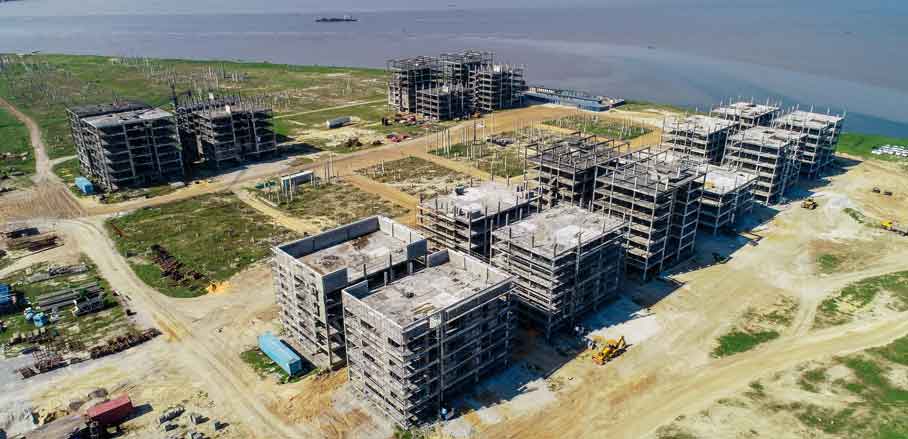Lagos: The Gaps Between Urban Policy and Urban Reality
In Lagos, Nigeria, Public Private Partnerships (PPP) are common in urban planning projects. But whom do they benefit: people or profit? Dr Taibat Lawanson argues that the city’s urban development strategy focusses too much on PPPs and thus favours profit over people – and calls to the state government to shift its focus back to a policy that benefits all citizens.
Lagos – Africa’s Model Megacity?
The Lagos state government has embarked on a series of development policies and projects. These are aimed at strategically positioning the city so that it attracts investment opportunities and achieves the vision of becoming Africa’s model megacity and global economic and financial hub. However, many of these policies and projects are largely determined by neoliberal market forces, rather than by the needs and realities of the population. They are often operationalised as Public-private partnerships (PPP), in which private capital and expertise are introduced to fund and implement public services.
Many PPP projects are justified in the name of the broader public good and given developmental process names such as “urban renewal” and “inner city regeneration”. Transiting to a more ‘formal’ and orderly city is seen as indicative of good governance, hence the motivation for city authorities to embark on such projects. However, what often occurs is gentrification: a process where low-income people are denied access to a place where they might have lived, worked, or shopped while middle class locals and tourists bring about a re-orientation of the city towards a population of elites and investors.
PPPs Gone Wrong: Three Examples from Lagos
A typical example is Ilubinrin, which used to be a thriving local community prior to the forced eviction exercise of 2013. It is now an abandoned PPP project site with an assemblage of uncompleted high-rise blocks of the proposed Ilubinrin Luxury estate.
The case of Sandgrouse market, one of the oldest indigenous markets in Lagos, is also indicative. The market was demolished in 2015 to make way for its redevelopment as an ultra-modern shopping mall via a PPP project. It is currently an empty, 19,600 square metre plot, fenced with rusty iron sheets. Hundreds of legal occupiers of the former market are now reduced to street trading, which is prohibited by Lagos state law.
Even though completed, the redeveloped Tejuosho market, also via PPP, remains a shadow of itself: it has been drained of its former liveliness as it has become unaffordable for most Lagosians. The reality is that 79.5 per cent of Lagosians live in absolute poverty, earning less than $1.9 daily in mostly informal economic activities.
A Questionable Trend
This is indicative of a prevailing trend: public spaces are increasingly being privatised, and as a result their exchange value takes precedence over their use value. This necessitates an interrogation of how PPPs are practiced in Lagos. The fact that many of these projects continue to result in negative socio-spatial and economic consequences for residents raises questions: Whose interests are being served in the conceiving, negotiating, and implementation of PPP projects?
A 2016 study on the impact of two PPP transportation projects in Lagos rated the projects poorly in value capture, future proofing, in-depth feasibility studies, stakeholder consultation, social inclusion, and effective communication. Transparency in the bidding process was considered non-existent for both projects.
The question that arises with practically every project delivered via the PPP model, be it in housing, transportation, and even in the delivery of water and waste management services, is: Is the Lagos state government outsourcing its responsibility to citizen’s welfare – by handing over the delivery of urban services to the private sector? This is highly worrisome, given the fact that many PPPs have performed sub-par.
Development Beyond Economic Growth
At the core of the Lagos development agenda is a desire to achieve urban physical and economic modernity, and PPPs have been identified as the most efficient route to achieving this. While the aspiration is not wrong, the uncritical embrace of neo-liberal economic policies has resulted in a city where citizens increasingly become victims of development projects.
Even though private funds are necessary to expand the city’s infrastructure to cater for its rapidly growing population, it must be reiterated that urban development goes beyond achieving economic growth. In fact, the social and environmental aspects of development are as critical as economic ones, especially in a city where the urban poor are the majority. Sustainable urban development is the synergistic integration of all subsystems in the city that guarantees a non-decreasing level of well-being to the local population in the long run. Hence, there is a strong need for a balance among the necessary components for shaping and implementing the Lagos development agenda:
While it is necessary to explore private sector participation in urban development, it behoves the Lagos state government to ensure that its citizens are protected and that their needs are prioritised in the deployment of PPP projects. It is only then that urban development can be sustainable, and that Lagos can become a City for People – rather than the City for Profit it currently is.
- Conceptualising The Liveable African City - 3. May 2022
- Lagos: The Gaps Between Urban Policy and Urban Reality - 30. October 2018
